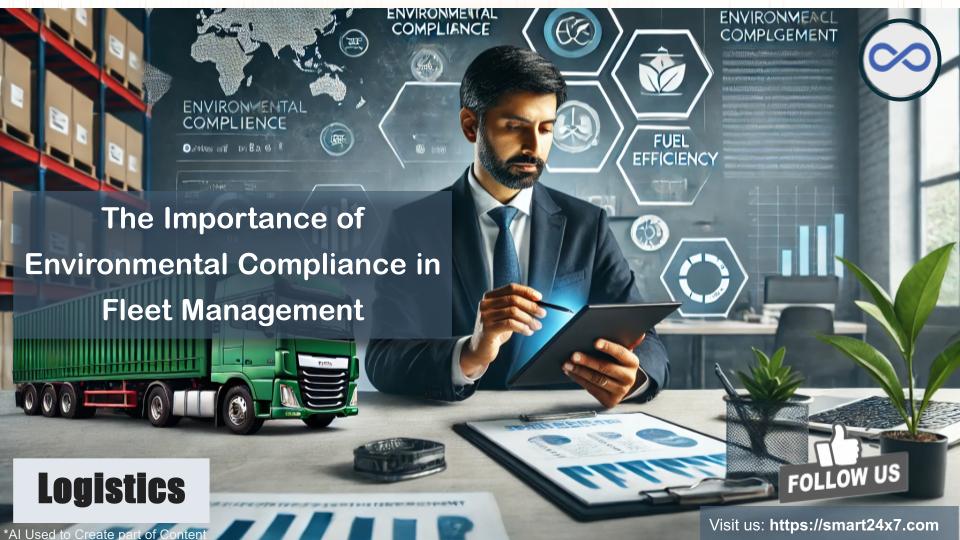In today’s business landscape, environmental compliance is more than just a regulatory obligation; it’s a critical component of responsible fleet management. As the push for sustainability intensifies, transport heads and procurement managers must prioritize environmental compliance to mitigate risks, enhance operational efficiency, and meet stakeholder expectations. At Smart24x7, a leading transport management system, we emphasize the significance of environmental compliance in fleet management. Here’s why it matters and how to achieve it.
- Regulatory Adherence
Avoiding Legal Consequences:- Compliance with Regulations: Adhering to environmental regulations, such as emission standards and waste disposal laws, helps avoid hefty fines and legal penalties.
- Staying Updated: Regularly update your knowledge of local, national, and international environmental laws to ensure ongoing compliance.
- Regulatory Frameworks: Implement robust frameworks that align with the latest environmental regulations and standards.
- Audit and Review: Conduct regular audits and reviews to ensure all practices meet regulatory requirements.
- Enhancing Corporate Reputation
Building Trust and Credibility:- Corporate Social Responsibility (CSR): Demonstrating a commitment to environmental compliance enhances your company’s CSR profile.
- Stakeholder Trust: Gaining the trust of stakeholders, including customers, investors, and partners, by showcasing your dedication to environmental sustainability.
- Green Certifications: Obtain green certifications and endorsements that validate your commitment to environmental compliance.
- Sustainable Branding: Promote your environmental initiatives as part of your brand identity, differentiating your company from competitors.
- Financial Benefits
Cost Savings:- Efficient Resource Use: Implementing eco-friendly practices often leads to reduced resource consumption and operational costs.
- Incentives and Grants: Take advantage of government incentives, grants, and subsidies for adopting green technologies and practices.
- Reduced Fines and Penalties: Compliance with environmental laws prevents costly fines and penalties.
- Maintenance Savings: Regular vehicle maintenance to meet emission standards can reduce wear and tear, leading to lower maintenance costs.
- Operational Efficiency
Optimizing Fleet Performance:- Fuel Efficiency: Implement fuel-efficient driving practices and technologies to reduce fuel consumption and emissions.
- Regular Maintenance: Ensure regular vehicle maintenance and timely upgrades to keep vehicles in optimal condition, thereby reducing their environmental impact.
- Telematics and Monitoring: Use telematics to monitor vehicle performance and emissions in real-time, enabling proactive decision-making.
- Analytics and Reporting: Leverage data analytics to identify inefficiencies and implement corrective measures promptly.
- Risk Management
Mitigating Environmental Risks:- Pollution Control: Implement measures to control pollution and manage hazardous materials effectively.
- Emergency Preparedness: Develop and maintain emergency response plans to handle environmental incidents swiftly and effectively.
- Real-Time Monitoring: Use advanced fleet management systems like Smart24x7 to track compliance with environmental standards in real-time.
- Automated Alerts: Set up automated alerts for potential compliance breaches to address issues before they escalate.
- Employee Engagement
Fostering a Green Culture:- Training Programs: Provide regular training for employees on environmental compliance and sustainable practices.
- Involvement Initiatives: Encourage employees to participate in sustainability initiatives and reward eco-friendly behaviors.
- Improved Working Conditions: A focus on environmental compliance can lead to improved air quality and safer working conditions for drivers and staff.
- Employee Morale: Employees take pride in working for a company committed to environmental sustainability, boosting morale and productivity.
- Technological Advancements
Adopting Green Technologies:- Electric and Hybrid Vehicles: Transition to electric or hybrid vehicles to significantly reduce emissions and fuel consumption.
- Eco-Friendly Innovations: Invest in eco-friendly technologies such as regenerative braking, energy-efficient tires, and advanced telematics.
- Charging Stations: Install charging stations for electric vehicles at key locations to support your green fleet.
- Renewable Energy Sources: Utilize renewable energy sources to power your facilities and reduce your overall carbon footprint.
Environmental compliance in fleet management is essential for legal, financial, operational, and reputational reasons. By prioritizing sustainability, transport heads and procurement managers can drive significant benefits for their organizations and contribute positively to the environment. At Smart24x7, we provide the tools and expertise needed to ensure your fleet operations are environmentally compliant and efficient.
Smart24x7 has been incubated by Smart Group India, underscoring our commitment to innovation and sustainability in transport management. Embrace environmental compliance with Smart24x7 and lead the way in creating a greener, more sustainable future for your fleet operations.mart24x7 and lead the way in creating a greener, more sustainable future for your fleet operations.
